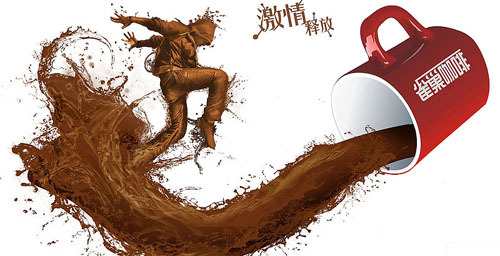The way to the success of Nestle Coffee Brand
In fact, the brand of Nestle Coffee is the same everywhere, and the pattern on the label may be the same, but the type, actual composition and taste of the product vary from country to country. There are more than 100 varieties of Nestle coffee, and their tastes vary according to the tastes of consumers in various countries, making it difficult for travelers to identify the product. Therefore, it may be more appropriate to regard Nestle coffee as an international concept than as an international coffee brand, because the standards for all its basic elements are the same.

The way to the success of Nestle Coffee Brand
As far as food brands are concerned, the strategy of producing products according to local tastes and preferences has been a great success, and it is often not feasible to follow a unified international strategy. Nestle Coffee is the most convincing example. As Nestle's business philosophy reflects, it follows the principle of "complete decentralization of authority" in structure and organization. This is also the expression of Nestle's "market mind (MarketHead)"-that is, ideas should be linked to market facts, and the actions and means taken should be in line with local needs and requirements. Mr. HelmutMaucher, chairman and CEO of Nestl é, felt strongly that Nestle Coffee companies are in the best position to analyze how their food products adapt to local tastes and preferences, taking into account national food-related regulations.
However, for a brand to become a market leader, as RamonMasip, Nestl é's executive vice president in Europe, holds, it must be a "low-cost manufacturer". If a company wants to achieve higher efficiency in marketing and advertising, it should make the way of information communication between its products and consumers more consistent and simplified. In Europe, for example, one way is to develop a new product for the whole of Europe under this positioning, and make it packaged and labeled exactly the same in all countries.
Perhaps most of the domestic public's understanding of Nestle coffee comes from its well-known slogan, "it tastes delicious!" It started. In fact, many people in the industry are also familiar with one of its classic anecdotes, that is, at the beginning of its birth, Nestle Coffee once caused a sales crisis by overemphasizing the convenience (instant) brought about by its technological breakthrough. The reason is that many housewives are reluctant to accept products that make people feel like they are "lazy". It was April 1, 1938, and the spray-drying coffee powder process developed by Nestl é was officially put into production in Switzerland, and the world's earliest instant coffee was born. Soon, Nestle coffee was sold in France, the United States, the United Kingdom and other countries.
Today, Nestle coffee is sold in more than 100 countries around the world, consuming 1.7 billion cups a year. Although nearly 24% of the company's turnover and 11 billion Swiss francs comes from drinks, Nestle Coffee is not just a manufacturer of instant coffee, fruit juices and mineral water. In 1990, Nestle's turnover was 46 billion Swiss francs, while in 1997, the turnover in the first 10 months was as high as 56.9 billion Swiss francs, an increase of 217.5% over the same period last year.
At the end of 1994, Nestle Coffee was selected as the third most valuable brand in the world by Financial World Magazine, with a value of 11.549 billion US dollars, second only to Coca-Cola and Marlboro. Its turnover distribution in various business areas is as follows: drinks (23.6%), cereal, milk and nutrition (20%), chocolate and confectionery (16%), cooking products (12.7%), frozen food and ice cream (10.1%), frozen food (8.9%), pet food (4.5%), drugs and cosmetics (3%), other products and businesses (1.1%). Nestle Coffee is regarded as one of the most successful operators in the consumer packaged food and beverage industry in the world.
Important Notice :
前街咖啡 FrontStreet Coffee has moved to new addredd:
FrontStreet Coffee Address: 315,Donghua East Road,GuangZhou
Tel:020 38364473
- Prev

Coffee man's feeling: no distractions, be a coffee man
Recently indulged in ESP beans, so I am always very active to communicate with my peers, a lot of details, some people often have unexpected gains. When communicating with mainland counterparts, some people talk vaguely about him. Someone kindly reminded: you are breaking taboos! On the other side of the sea, I got a lot of responses. I think, perhaps because of different regions, there is no conflict of interest.
- Next

"I love coffee" online game to create a popular cafe
"I LVOE COFFEE" is a highly interactive game that allows players to learn to open a store. The cute characters and funny customer expressions in the game make Korean players crazy.
Related
- What documents do you need to go through to open a coffee shop? coffee shop coffee shop certificate processing process
- How to purchase Coffee beans in small Cafe how to choose a suitable supplier for domestic Coffee supply Company
- How to drink Starbucks Fragrance White Coffee? how to make Australian White Coffee? what Italian coffee beans are recommended?
- The Story of Flora Coffee: the name of Flora Coffee Bean and the implication of the Flowers on Florna Coffee
- How much does a cup of coffee cost? How much is the profit of a cup of coffee? What is the profit of the coffee shop in a year?
- Yunnan small Coffee, known as "fragrant Coffee", introduces the characteristics of Alpine Arabica Coffee producing areas in Yunnan, China
- 2023 latest Starbucks full menu price list how much is a cup of Starbucks coffee what is better to drink the most popular hot and cold drinks recommended
- Starbucks different kinds of Coffee Price list Starbucks menu 2023 Top Ten Best drinks in Starbucks
- Starbucks Spring praise Comprehensive matching Coffee Bean theme Story Packaging implication and taste description
- The cost of a cup of coffee latte American coffee cost price and selling price

